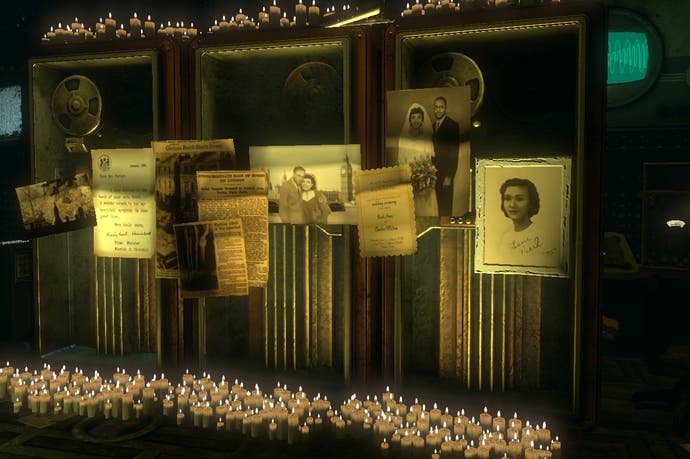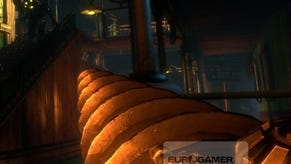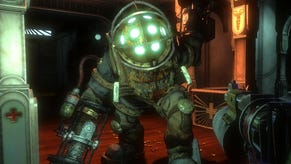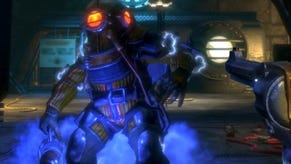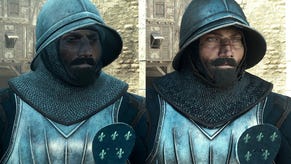Bioshock 2 - Minerva's Den retrospective
What's all this, Den?
Bioshock will never really be remembered for its high concept ideas or the way it plays around with the lack of autonomy within an FPS. The legacy is Andrew Ryan, and Rapture, and everything that a game can do to bring to life the failed dream of a larger-than-life figure. It'll be remembered for that scene with the golf club, and for Sander Cohen and Fort Frolic. Bioshock 2 had Sofia Lamb and the Big Sister, and an even more dilapidated Rapture falling apart at the seams. As high-falutin' as Bioshock gets, it's only as strong as its antagonists.
Minerva's Den doesn't have much of an antagonist. At the centre of the story is The Thinker, a primitive AI that was Rapture's inconspicuous taskmaster, managing all the sentry bots and automatic doors. It's the heart of Minerva's Den, and on either side of it you have Charles Milton Porter and Reed Wahl. The former your friend, the latter your foe.
Wahl isn't much of a villain when framed against the rest of Bioshock's rogues gallery. He's more of a minion than an overlord, and despite his ravings over the radio, he's never really in charge. He's a caretaker, looking after and manically protecting The Thinker while you're guided by the rational voice of Charles Milton Porter, Wahl's exiled partner. For just a few hours of DLC, Minerva's Den took the Bioshock formula and spliced it, ending up with something that was unique and different. And when Bioshock was already pretty unique and different, that made it special.
"The intent was always to tell Porter's story." Steve Gaynor was the writer and Lead Designer on Minerva's Den, and now heads up The Fullbright Company, making Gone Home. "The point was to make you empathise with Porter, and create someone you wanted to help and work with." Andrew Ryan and Sofia Lamb were interesting characters, and excellent antagonists, but they were hostile forces, sinister and omnipresent and aiming to hinder you at every turn. Porter, on the other hand, is there to help you.
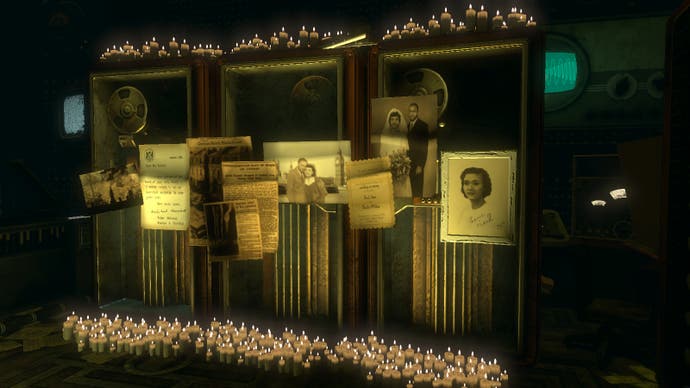
You need to get The Thinker out of Rapture, or at least the computer's blueprint. Porter wants to salvage something from this grand failure of an experiment, and for him The Thinker is the thing that could change the world. You have to fight your way through Minerva's Den to get to it, and that won't be easy, but then, as Porter says: "Nothing worth doing ever is."
"That was an implicit message to the player." Gaynor elaborates. "We're going to make you work a bit, but it'll be worth it in the end." He's not talking about the difficulty of the combat scenarios, but instead the concepts surrounding the plot. It's only a few hours long, and the story it tells is one that fits that amount of time; this isn't grandiose, and the ideas it's wrestling with aren't general, or universal. It's a personal story about a single man.
"The thing with DLC that you really have to be conscious of is that no matter what you change you're always going to make an expansion of the base game. You are making more of Bioshock 2, but you can do something interesting within those constraints." And that means adopting ideas that are central to Bioshock and tweaking them to fit the story you want to tell.
"We could take the themes of Bioshock that are native to Rapture, and make them relevant to the specific fiction of Minerva's Den. When you have a super computer that can do a million calculations a second, how does that fit into the ideas of free will and predestination and fate, and choice, that Bioshock is built on?" Wahl believes he has programmed The Thinker to predict the future, and he hangs failure over you like a Damoclean Sword. He goads you over the radio, assured that you can't possibly succeed. And yet you continue on anyway, because the impossible is kind of what Rapture is all about.
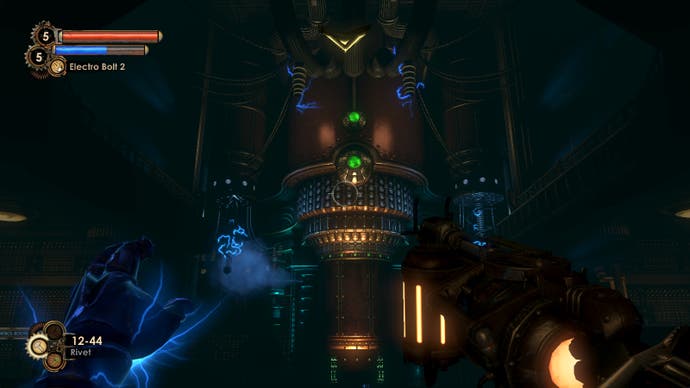
"[Free will is] not the core theme of Porter's story, but it is what drives the events towards the resolution of Porter's core concerns, which are about his past and trying to change that past, and get something back that was lost." The Thinker is a way for him to recreate his wife Pearl, bring her back from the dead and at least be able to talk to her again. He trains the machine to emulate her personality, oblivious that an emulation isn't going to make her loss any less painful.
Both are trying to turn The Thinker into a tool for their own purposes, without ever paying attention to the fact that this isn't some array of punch-cards waiting to spit out calculations. It's what makes the reveal, that Porter isn't Porter but instead The Thinker adopting a personality that will be familiar and comforting, a powerful one. The Thinker sits in the background of the story for the duration, barely saying a word, and it's only at that reveal that you even take a moment to consider it an entity in its own right.
"Something that's interesting about a character being a computer, especially a primitive AI like The Thinker, is that we can say it doesn't have a lot of personality, so you can't read its intent. And you don't, throughout most of the campaign, have the ability to judge what The Thinker wants, or what personality it has. It's just an entity that is doing things but you can't really tell why. It was important to maintain that so that when you find it's been impersonating these other personalities, you don't have its native personality to fight with when it's impersonating Porter, or Pearl."
It forces you to engage with the role of character within the story, especially when it comes to Porter. As much as he's been made hollow by his lack of presence in the present, he's still genuine in the audio logs, and still genuine in the role of protagonist. Because rendering Porter a Big Daddy, wiping his memory, was the only way to ensure he and Tenenbaum could get The Thinker out of Rapture. Rendering him Sigma: the character you play as, the game's protagonist.
"In Bioshock 1 and 2 you play this cypher and you're not a voiced character. You have a connection to characters who are external to the character, and that's still powerful, but there isn't a feeling that the character you are has an identity, and means something to you. We had to have a silent protagonist in the present tense, but that was what the logs gave us. You only think of yourself as this suit throughout this play experience, and then you realise, when you get to the twist, the identity of the protagonist in retrospect. I'm happy with the idea that you have this rush at the end of additional significance, suddenly knowing who you were playing the whole time."
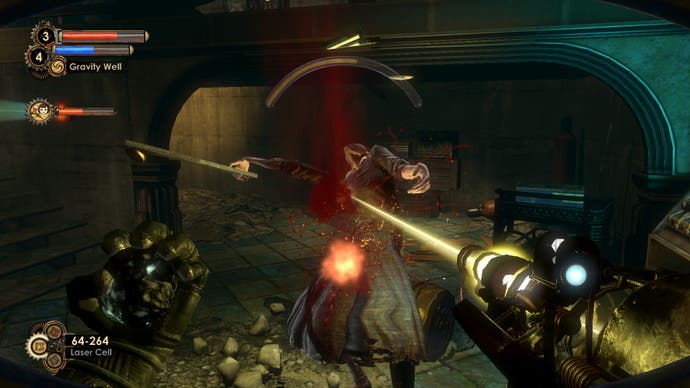
You're given evidence throughout Minerva's Den of why you should empathise with Porter; he's the rational one, the contemporary of Alan Turing, the brilliant mathematician who has created artificial life, who has lost so much and has now lost everything else in the fall of Rapture. You can't help but feel for him. His tragedy is your tragedy, and the reveal hammers home that point harder than most games can manage. After the climax of the story, the face off with Reed Wahl and the rescue of The Thinker's blueprint, you're left to wander through Porter's living space. Where he sat by the fire, his bookcases, and the reclusive cave where he spent his time obsessing over resurrecting his wife digitally.
"I think it was important that we gave you some downtime to think about what had happened, and what this character had been through." There's a vast board covered with photos of Pearl, Porter's wife, and letters between the two. Hover the cursor over any of them and the words fill the screen, letting you pore over them. "Because he has such tunnel vision in achieving his goal, it would only be after he completed it that he'd realise it wasn't what he wanted. Only after The Thinker could recreate his wife's personality, he would realise it was futile." Porter's own mini-Rapture, a grand experiment that was doomed from the start.
There's a certain irony that the closest Bioshock has ever come to System Shock in terms of theme and mechanics is also the furthest it's ever been in terms of how the story is executed. Ammo might be scarce, and you might be crawling around in the guts of some grand machine while some AI whispers in your ear, but Minerva's Den is never really about The Thinker, but instead Porter salvaging something from all the failed promise of Rapture. For a four-hour add-on to arguably the lesser of the two Bioshocks we've had so far, it's an impressive accomplishment.
